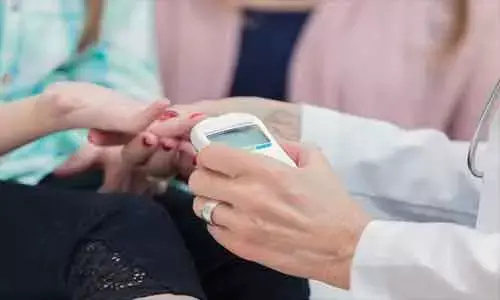- Home
- Medical news & Guidelines
- Anesthesiology
- Cardiology and CTVS
- Critical Care
- Dentistry
- Dermatology
- Diabetes and Endocrinology
- ENT
- Gastroenterology
- Medicine
- Nephrology
- Neurology
- Obstretics-Gynaecology
- Oncology
- Ophthalmology
- Orthopaedics
- Pediatrics-Neonatology
- Psychiatry
- Pulmonology
- Radiology
- Surgery
- Urology
- Laboratory Medicine
- Diet
- Nursing
- Paramedical
- Physiotherapy
- Health news
- Fact Check
- Bone Health Fact Check
- Brain Health Fact Check
- Cancer Related Fact Check
- Child Care Fact Check
- Dental and oral health fact check
- Diabetes and metabolic health fact check
- Diet and Nutrition Fact Check
- Eye and ENT Care Fact Check
- Fitness fact check
- Gut health fact check
- Heart health fact check
- Kidney health fact check
- Medical education fact check
- Men's health fact check
- Respiratory fact check
- Skin and hair care fact check
- Vaccine and Immunization fact check
- Women's health fact check
- AYUSH
- State News
- Andaman and Nicobar Islands
- Andhra Pradesh
- Arunachal Pradesh
- Assam
- Bihar
- Chandigarh
- Chattisgarh
- Dadra and Nagar Haveli
- Daman and Diu
- Delhi
- Goa
- Gujarat
- Haryana
- Himachal Pradesh
- Jammu & Kashmir
- Jharkhand
- Karnataka
- Kerala
- Ladakh
- Lakshadweep
- Madhya Pradesh
- Maharashtra
- Manipur
- Meghalaya
- Mizoram
- Nagaland
- Odisha
- Puducherry
- Punjab
- Rajasthan
- Sikkim
- Tamil Nadu
- Telangana
- Tripura
- Uttar Pradesh
- Uttrakhand
- West Bengal
- Medical Education
- Industry
Onset of diabetes at younger age linked to poorer blood sugar control

Researchers have found that patients of type 2 diabetes diagnosed between the ages of 21 and 44 years have a lower likelihood of achieving proper blood sugar control within one year of diagnosis versus patients diagnosed in middle age.The findings of the study have been published in Diabetes Care.
The prevalence of type 2 diabetes is increasing among adults under age 45. Onset of type 2 diabetes at a younger age increases an individual's risk for diabetes-related complications. The researchers compared glycemic control and initial care between adults with younger onset (21–44 years) and midage onset (45–64 years) of type 2 diabetes given the lasting benefit early glycemic control confers.
The researchers at Kaiser Permanente Northern California in Oakland examined data from a large, integrated health care system to identify 32,137 adults (aged 21 to 64 years) with incident diabetes (first HbA1c, ≥6.5 percent). They compared glycemic control and initial care between adults with younger onset of type 2 diabetes (21 to 44 years) to that of patients with middle-age onset (45 to 64 years).
They found that 26.4 percent had younger-onset and 73.6 percent had middle age-onset type 2 diabetes. Higher initial mean HbA1c values (8.9 percent) were seen among adults with younger onset versus adults with middle-age onset (8.4 percent). Even after adjusting for HbA1c at diagnosis, adults with younger onset had lower odds of achieving an HbA1c <7 percent one year after diagnosis (adjusted odds ratio [aOR], 0.70; 95 percent confidence interval [CI], 0.66 to 0.74). Compared with patients with middle-age onset, adults with younger onset had lower odds of in-person primary care contact (aOR, 0.82; 95 percent CI, 0.76 to 0.89), but they did not differ in telephone contact (aOR, 1.05; 95 percent CI, 0.99 to 1.10). Odds of starting metformin were higher in adults with younger onset (aOR 1.20; 95 percent CI, 1.12 to 1.29), but they had lower odds of adhering to the medication (aOR, 0.74; 95 percent CI, 0.69 to 0.80).
The researchers concluded that adults with onset of type 2 diabetes at a younger age were less likely to achieve glycemic control at 1 year following diagnosis, suggesting the need for tailored care approaches to improve outcomes for this high-risk patient population.
For further reference log on to:
Diabetes Care 2020 Feb; dc191380.
Dr Kamal Kant Kohli-MBBS, DTCD- a chest specialist with more than 30 years of practice and a flair for writing clinical articles, Dr Kamal Kant Kohli joined Medical Dialogues as a Chief Editor of Medical News. Besides writing articles, as an editor, he proofreads and verifies all the medical content published on Medical Dialogues including those coming from journals, studies,medical conferences,guidelines etc. Email: drkohli@medicaldialogues.in. Contact no. 011-43720751


